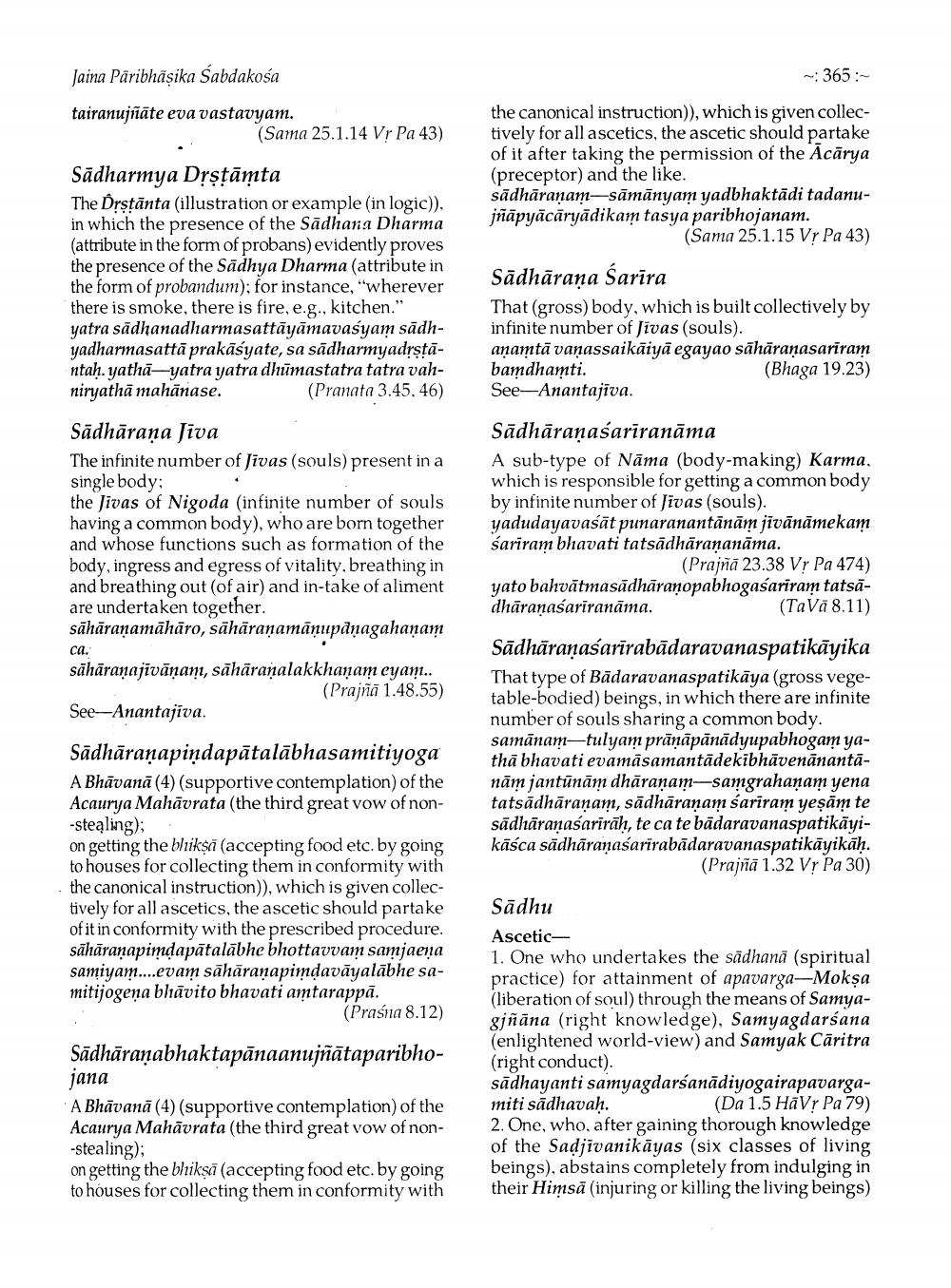________________
Jaina Paribhāṣika Sabdakosa
tairanujñāte eva vastavyam.
(Sama 25.1.14 Vr Pa 43)
Sādharmya Dṛṣṭāmta
The Drstanta (illustration or example (in logic)). in which the presence of the Sadhana Dharma (attribute in the form of probans) evidently proves the presence of the Sadhya Dharma (attribute in the form of probandum); for instance, "wherever there is smoke, there is fire, e.g., kitchen." yatra sadhanadharmasattāyāmavasyam sadhyadharmasatta prakāśyate, sa sädharmyadṛṣṭāntah, yatha-yatra yatra dhumastatra tatra vahniryatha mahānase. (Pranata 3.45, 46)
Sadhārana Jiva
The infinite number of Jivas (souls) present in a single body:
the Jivas of Nigoda (infinite number of souls. having a common body), who are born together and whose functions such as formation of the body, ingress and egress of vitality, breathing in and breathing out (of air) and in-take of aliment are undertaken together. sāhāraṇamāhāro, sāhāraṇamāṇupāṇagahaṇam
ca.
sāhāraṇajīvāṇam, sāhāraṇalakkhanam eyam.. (Praja 1.48.55)
See-Anantajiva.
Sadharaṇapindapätaläbhasamitiyoga A Bhāvanā (4) (supportive contemplation) of the Acaurya Mahavrata (the third great vow of non-stealing):
on getting the bikşi (accepting food etc. by going to houses for collecting them in conformity with the canonical instruction)), which is given collectively for all ascetics, the ascetic should partake of it in conformity with the prescribed procedure. saharaṇapimḍapātalabhe bhottavvam samjaena samiyam....evam sahāraṇapimḍavāyalābhe samitijogena bhāvito bhavati amtarappā.
(Praśna 8.12)
Sadhāraṇabhaktapānaanujñātaparibho
jana
A Bhāvanā (4) (supportive contemplation) of the Acaurya Mahāvrata (the third great vow of non-stealing);
on getting the bliks (accepting food etc. by going to houses for collecting them in conformity with
~:365:~ the canonical instruction)), which is given collectively for all ascetics, the ascetic should partake of it after taking the permission of the Acarya (preceptor) and the like.
sädhäraṇam-sämanyam yadbhaktādi tadanujñāpуācāryadikam tasya paribhojanam. (Sama 25.1.15 Vṛ Pa 43)
Sadharana Sarira
That (gross) body, which is built collectively by infinite number of Jivas (souls).
aṇamtā vaṇassaikāiyā egayao sāhāraṇasarīram bandhamti. (Bhaga 19.23)
See-Anantajiva.
Sādhāraṇasariranāma
A sub-type of Nama (body-making) Karma. which is responsible for getting a common body by infinite number of Jivas (souls). yadudayavasat punaranantānām jīvānāmekam Sariram bhavati tatsädhärananäma. (Prajna 23.38 Vr Pa 474) yato bahvātmasādhāraṇopabhogasarīram tatsä(Tava 8.11)
dharanasariranāma.
Sādhāraṇaśarīrabādaravanaspatikāyika That type of Badaravanaspatikaya (gross vegetable-bodied) beings, in which there are infinite number of souls sharing a common body. samanam-tulyam pränäpänädyupabhogam yatha bhavati evamäsamantadekibhävenänantănām jautānām dharanam-samgrahaṇam yena tatsādhāraṇam, sädhäraṇam sariram yeṣām te sadharanasarirah, te ca te bädaravanaspatikäyikāśca sadhāraṇasarirabadaravanaspatikāyikāḥ. (Praja 1.32 Vr Pa 30)
Sādhu
Ascetic
1. One who undertakes the sildhand (spiritual practice) for attainment of apavarga-Mokṣa (liberation of soul) through the means of Samyagjñāna (right knowledge), Samyagdarśana (enlightened world-view) and Samyak Caritra (right conduct).
sadhayanti samyagdarśanadiyogairapavargamiti sadhavaḥ. (Da 1.5 HaVr Pa 79) 2. One, who, after gaining thorough knowledge of the Sadjivanikayas (six classes of living beings), abstains completely from indulging in their Himsă (injuring or killing the living beings)




